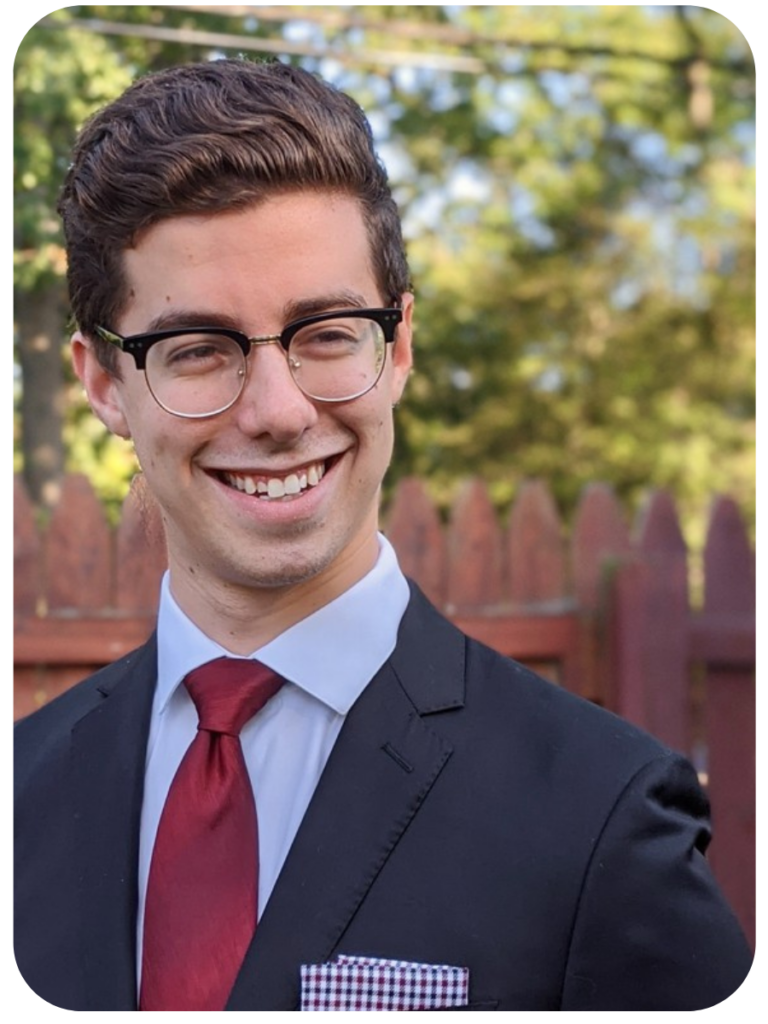Zev Burton

Zev (’23) is one of our first BS-MS Accelerated Degree students and entered the program from the School of Foreign Service (SFS) in 2021 during his last year of earning his BSFS in International Politics.
As a published author with a background in international politics and security and 250,000 Tik-Tok followers, this 22-year-old might just be on his way to being a renaissance man.
Journey to DSAN
Zev knew in his first semester in the SFS that he wanted to take the political history and theory. He was learning and focused on making a difference in the world by solving current-day problems. The question was how.
Not long after joining Georgetown for his Bachelor’s in the SFS, Zev met Dr. Kimberly Sellers, a professor and statistician in the Math and Statistics department, at a research fair. In the two years he worked with her, they often talked about Zev’s desire to interact more with actual, current data instead of historical data. Dr. Sellers wisely coaxed him into taking more math and stats classes. He found he enjoyed getting hands-on with code and, with Dr. Sellers’ encouragement and assistance, applied for the BS-MS with DSAN.
The breadth of knowledge afforded by Zev’s combined education in the SFS and now data science and analytics has given him a path forward that he is truly passionate about: Helping to build a bridge between international policy and data, especially using data to ensure that diplomatic policy is working.
An Unexpected Turn
One aspect of Zev’s journey was wholly unexpected: TikTok activist and creator.
Zev had written a book called Two Fish in a Tank: How Jokes Can Give Hope in a Fractured World. He was inspired by the writings of holocaust survivors, many of whom talked about how they made jokes in the camps to deal with the day-to-day horrors, and how humor is often present in even the most brutal situations as a means to cope and process. After writing his book and publishing it during the pandemic, his sister suggested that he go on TikTok to promote it. As Zev knew nothing about TikTok, it wasn’t the most successful of marketing plans. It wasn’t until he posted a short video about an obscure math summation before heading into his Russian class that he had his first brush with being a bit of a viral sensation.
He broke 5,000 followers pretty quickly but truly saw his TikTok profile blow up when he began posting on January 6, 2020. He was in DC at the time and used his platform and his SFS studies in domestic terrorism to give context and background to what was happening. As often happens, the internet was not always kind. Antisemitic vitriol rolled in. When he spoke about antisemitism, his profile blew up exponentially. He had his first million-view video. Putting it in context, Zev says, “Imagine that many people watching you speak in an auditorium.” As he progressed in the DSAN program he began to speak out about data misinformation. His dedicated following tripled to 250,000.
Zev is an excellent student who is full of energy, enthusiasm and has great communication skills. He is always very engaging and humorous in class as well as while presenting his research findings, which I think is a great quality as I’m always keen to hear Zev presenting. He is a very talented student and I can’t wait to see his next great adventure”
Dr. Purna Gamage, DSAN Program Director
Focusing on the Future
Zev’s ability and passion for communicating complex ideas and topics have become integral to his success in the DSAN program. He loves how the program emphasizes the importance of data communication. He states that anyone from any school can run the models, but DSAN emphasizes the importance of being able to tell the story. “A good data scientist can connect with the general public,” he says. “Data means nothing if you can’t explain why it matters”.
His training at DSAN has given him a breadth of knowledge and a deeper world perspective. He believes the best way to learn about the world is to know the “why” behind what you are learning.